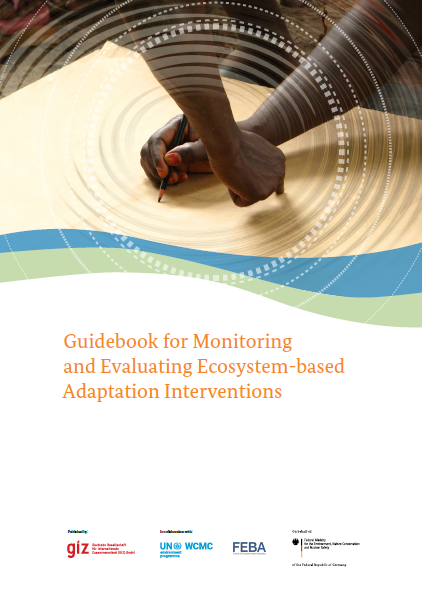Launch of FEBA Guidebook for Monitoring and Evaluating Ecosystem-based Adaptation Interventions
Effective monitoring and evaluation of EbA outcomes is essential to learn from best practices and reduce uncertainties about effectiveness and long-term impacts. Acknowledging this need, Friends of Ecosystem-based Adaptation (FEBA) partners came together to produce the Guidebook for Monitoring and Evaluating Ecosystem-based Adaptation Interventions. Drawing from FEBA’s wide network of practice-based experience, and the collaboration and expertise of the working group on Monitoring & Evaluation of EbA, the Guidebook provides practitioners and planners with a clear process for developing and operationalizing effective M&E for EbA.

Photo: UNEP-WCMC, GIZ, and FEBA
Climate change is a stark reality, which is fast affecting not only the life-supporting systems on the planet but also the world economies. Through trial and error, we have realized the importance of nature-based solutions for climate adaptation, also known as Ecosystem-based Adaptation (EbA). The effectiveness of EbA is now widely recognized and interventions are being implemented across the globe by governments, the private sector, and community groups. As the prevalence of EbA as an adaptation option increases, understanding the outcomes of these interventions and learning from good practices is more important than ever.
Effective monitoring and evaluation of EbA outcomes is essential to learn from best practices and reduce uncertainties about effectiveness and long-term impacts. Acknowledging this need, Friends of Ecosystem-based Adaptation (FEBA) partners came together to produce the Guidebook for Monitoring and Evaluating Ecosystem-based Adaptation Interventions. Drawing from FEBA’s wide network of practice-based experience, and the collaboration and expertise of the working group on Monitoring & Evaluation of EbA, the Guidebook provides practitioners and planners with a clear process for developing and operationalizing effective M&E for EbA.
The Guidebook is a practical roadmap to better understand the outcomes and impacts of on-the-ground projects that work with and enhance nature to reduce the negative impacts of climate change on people. Recognising that there is no one-size-fits-all approach for M&E, the Guidebook breaks this process down into four key steps that any project team of an EbA intervention can follow: namely, (1) Developing a results framework, (2) Defining indicators and setting a baseline, (3) Operationalising monitoring and evaluation system, and (4) Using and communicating the results. The Guidebook describes key considerations and components for each step of M&E for EbA projects and points to additional tools and methodologies that can be used in specific circumstances.
The emphasis is on going beyond simply measuring the activities and outputs of an EbA intervention, to evaluating the results – namely the outcomes and impacts – of those actions. Focusing on outcomes is essential for understanding whether EbA measures are having the desired effects to increase both human and ecosystems resilience.
Ideally, the Guidebook should be consulted in the early stages of designing an EbA intervention as it will help clarify the logic underlying the measures, including their intended pathway of change. However, it can also be used if the implementation of an EbA intervention has already begun to help make improvements to the original logical framework and M&E system of the intervention, if these exist, or to develop them, if they are not yet in place.
The Guidebook for Monitoring and Evaluating Ecosystem-based Adaptation Interventions is a joint publication by the UN Environment Programme World Conservation Monitoring Centre (UNEP-WCMC), Deutsche Gesellschaft für Internationale Zusammenarbeit (GIZ), and Friends of Ecosystem-based Adaptation (FEBA) of the International Union for Conservation of Nature (IUCN). The Guidebook was funded by the Global Project Mainstreaming EbA, which is implemented by GIZ on behalf of BMU, as part of the International Climate Initative (IKI). The Federal Ministry for the Environment, Nature Conservation and Nuclear Safety (BMU) supports this initiative on the basis of a decision adopted by the German Bundestag.
Download the FEBA M&E Guidebook here.
About Friends of EbA (FEBA):
FEBA is a global collaborative network of 75+ agencies and organisations involved in EbA working jointly to share experiences and knowledge, to improve the implementation of EbA related activities on the ground, and to have a stronger and more strategic learning and policy influence on EbA. FEBA enhances mutual learning and sharing of experiences between these organisations to make EbA more effective and demonstrate its value-addition as an adaptation option. FEBA works to synthesize this multi-stakeholder knowledge on EbA; disseminate this knowledge by convening the global EbA community around high-level events, technical workshops, and expert working groups; and raise awareness and understanding of EbA in adaptation planning processes and multilateral policy frameworks (e.g. UNFCCC, Nairobi Work Programme). The CBD COP recognizes FEBA as a key partner “to support Parties in their efforts to promote ecosystem-based approaches to climate change adaptation” (Decision 14/5).



